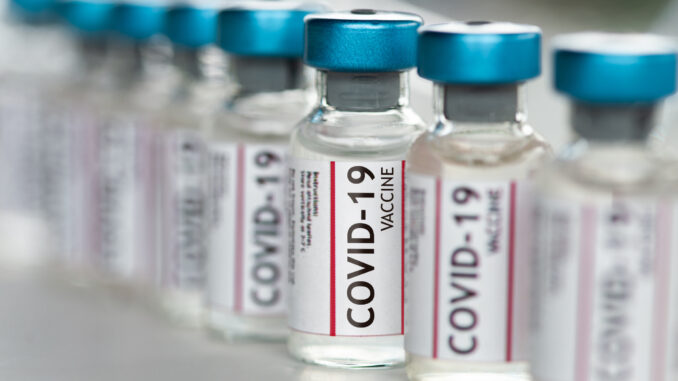
By Hank Russell
Governor Kathy Hochul signed an Executive Order that will allow pharmacists to administer COVID vaccines, providing access for all New Yorkers who wish to be vaccinated. The Executive Order will be in place for at least 30 days while a long-term legislative solution is developed to address access to all vaccines in order to combat what the governor says is the Trump Administration’s misguided attack on immunization and healthcare. The announcement was made on September 5.
According to Hochul, the executive order will:
- allow physicians and nurse practitioners to prescribe and order a patient-specific or non-patient-specific regimen for pharmacists to administer COVID vaccines to patients age three or older.
- authorize pharmacists to administer COVID vaccines to patients age three or older pursuant to a patient-specific or non-patient-specific order.
- allow pharmacists to prescribe and order COVID vaccines for patients aged three or older — a new authority that enables them to prescribe off-label.
To support this expansion, Hochul said, New York State Health Commissioner Dr. James McDonald will also be issuing a standing order for the COVID vaccine, ensuring that pharmacists statewide can continue to provide timely and convenient access. In the coming days, McDonald and the Department of Health will issue detailed guidance to support pharmacies, clinicians and other vaccine administrators.
“I promised New Yorkers that their family would be my fight. In the absence of federal leadership, we must do everything we can to ensure that New Yorkers have access to the vaccines and preventative healthcare they have come to rely on,” Hochul said. “By signing this executive order, we are sending a clear message that when Washington Republicans play politics with public health, New Yorkers can still get the care they need, close to home, from trusted providers in their own communities.”
“Governor Hochul’s Executive Order provides access to the COVID vaccine for New Yorkers who choose to get vaccinated, sets us up for a smoother transition to the updated 2025-26 vaccine and restores pharmacies as a vital part of our vaccination network,” McDonald said. “While New York State does not require COVID vaccines, vaccination remains one of the most effective tools we have to prevent serious illness, hospitalization, and death from COVID.”
Most pharmacies in New York rely on “standing orders” — non-patient-specific prescriptions that give them authority to administer vaccines to broad groups of people. These standing orders are typically based on recommendations from the federal Advisory Committee on Immunization Practices (ACIP). Just this summer, according to the governor’s office, the federal government pulled more than $500 million in mRNA vaccine funding — undoing what had once been considered a signature achievement of the first Trump Administration — creating further uncertainty around access.
In June, U.S. Health and Human Services (HHS) Secretary Robert F. Kennedy Jr. replaced a majority of ACIP members with individuals who Hochul said are known to oppose vaccinations. Since then, ACIP has not issued updated guidance for the 2025-26 COVID vaccine and is not scheduled to meet until September 18.
Without that federal guidance, many pharmacies in New York began restricting access to the COVID vaccine, particularly for children ages 3 to 17, women who are pregnant and adults under age 65 without underlying conditions.
In response, a HHS Department spokesperson told LILP that the agency is not withholding access to vaccines. “The COVID vaccine remains available for anyone who chooses it in consultation with their healthcare provider,” the spokesperson said, adding that the four vaccines approved by the Food and Drug Administration — Comirnaty, Mnexspike, Nuvaxovid, and Spikevax — “with updated 2025-2026 formulas continue to provide important protection against COVID-19.”
The HHS Department recently announced that it is reinstating the Task Force on Safer Childhood Vaccines, a federal panel created by Congress to improve the safety, quality, and oversight of vaccines administered to American children. It was disbanded in 1998.
“By reinstating this Task Force, we are reaffirming our commitment to rigorous science, continuous improvement, and the trust of American families,” said National Institutes of Health (NIH) Director Jay Bhattacharya. “NIH is proud to lead this effort to advance vaccine safety and support innovation that protects children without compromise.”
Hochul said her executive order addresses this gap by declaring a 30-day statewide emergency and expanding who can prescribe and administer COVID vaccines. The EO allows physicians and nurse practitioners to issue patient-specific or non-patient-specific orders to pharmacists for patients as young as age three, expands pharmacists’ authority to administer vaccines to children under 18, and, for the first time, permits pharmacists to prescribe COVID vaccines themselves.
Together, these actions ensure that all eligible New Yorkers — including children, pregnant people, and healthy adults under 65 — can continue to receive COVID vaccinations at their local pharmacy without delay.
Long Island Life & Politics reached out to the governor’s office and asked if there was a contingency plan in place in the event there is a shortage or supply chain issues. In response, a state Health Department spokesperson said in a statement, “The state is not currently anticipating a shortage of COVID-19 vaccines. New York is in close communication with manufacturers to monitor supply and distribution, and we will take additional steps if needed to ensure availability.”
Hochul said she will begin working with the Legislature on a legislative solution that will ensure permanent and continuing access to vaccines, including administration of vaccines by health care professionals, school immunization schedules, and insurance coverage of vaccines.
New York is also working in coordination with a regional multi-state public health collaboration among Northeast states, which brings together public health leaders across the region to develop evidence-based recommendations and approaches on vaccination, disease surveillance, and emergency preparedness, Hochul said. The collaborative also supports state public health laboratories in sharing resources and expertise to strengthen regional readiness.

